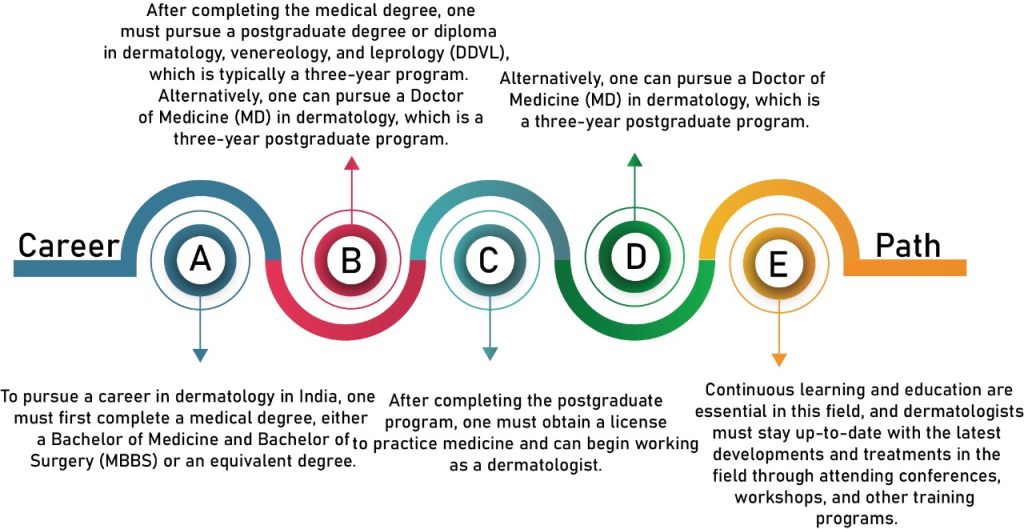Dermatology is a medical specialty that focuses on the diagnosis, treatment, and prevention of conditions and diseases of the skin, hair, nails, and mucous membranes. Dermatologists are medical doctors who specialize in this field and have extensive knowledge of the anatomy and physiology of the skin, as well as the various medical, surgical, and cosmetic treatments available for skin disorders. Common conditions treated by dermatologists include acne, eczema, psoriasis, skin cancer, and aging-related changes to the skin. In addition to medical treatment, dermatologists also provide guidance on how to maintain healthy skin and prevent future skin problems.

Work description
The work of a dermatologist involves conducting patient consultations to evaluate skin concerns and determine appropriate treatment plans, which may involve prescribing medications, performing surgical procedures, or providing guidance on lifestyle changes.
Dermatologists also perform skin cancer screenings and may collaborate with other medical professionals such as oncologists or plastic surgeons to provide comprehensive care for patients.
Additionally, some dermatologists offer cosmetic procedures such as Botox injections, chemical peels, and laser treatments to help patients improve the appearance of their skin.
High Demand
There is a growing demand for dermatologists due to the increase in skin-related conditions and diseases.
High salary
Dermatology is a lucrative field, with a high earning potential for specialists.
Variety of for innovation
Dermatology offers a diverse range of patients and cases, from treating acne to performing surgical procedures.
Personal fulfillment
Helping patients improve their skin health and appearance can be personally rewarding.
Job security
As a medical doctor, you have job security, and dermatologists are no exception.
Good work-life balance
Dermatologists generally work regular hours and have good work-life balance.
Extensive training
Becoming a dermatologist requires several years of education and training, which can be time-consuming and expensive.
High-pressure environment
Dermatology can be a high-pressure environment, with long hours and a heavy workload.
Challenging cases
Some dermatology cases can be difficult to diagnose and treat, requiring extensive research and collaboration with other specialists.
Liability risks
As with all medical professions, dermatologists face potential liability risks from malpractice lawsuits and other legal issues.
Competitive specialty
Dermatology is a highly competitive specialty, with a limited number of residency spots available each year.
Repetitive tasks health issues
Some dermatological procedures, such as biopsies, can be repetitive and monotonous.
The cost of pursuing a career in dermatology in India can vary depending on several factors, including the institution and the type of program.
Generally, to become a dermatologist in India, one must complete a medical degree, followed by a postgraduate degree or diploma in dermatology. The cost of a medical degree in India can range from INR 5-25 lakhs for government institutions and INR 25-75 lakhs for private institutions.
The cost of a postgraduate degree or diploma in dermatology can range from INR 1-10 lakhs per year, depending on the institution. Additionally, there may be additional costs associated with training, licensing, and ongoing education.
[wpcharts type=”horizontalbarchart” bgcolor=”red:gray:yellow,blue:gray:yellow,random:gray:yellow,purple:gray:yellow” min=”0″ legend=”true” titles=”2 year , 5 year” values=”3,7,5,12″]
The earning potential of a dermatologist in India can vary depending on several factors, including the years of experience, location, and type of practice.
On average, a dermatologist in India can expect to earn a salary ranging from INR 6-40 lakhs per annum. However, this can vary significantly based on factors such as the type of practice, whether they work in a government or private institution, and whether they offer additional cosmetic services.
Dermatologists who work in private practices or run their own clinics typically have higher earning potential compared to those who work in government institutions.
Additionally, those who offer cosmetic services such as Botox injections, laser treatments, and chemical peels can earn additional income.
[wpcharts type=”horizontalbarchart” bgcolor=”red:gray:yellow,blue:gray:yellow,random:gray:yellow,purple:gray:yellow” min=”0″ legend=”false” titles=”Entry-Level, Mid-Career, Senior-Level ” values=”5,15,25,35,45,55″]
Strong interest in the field of medicine and dermatology.
Attention to detail and ability to identify and diagnose skin conditions accurately.
Excellent communication skills to interact with patients and colleagues.
Good manual dexterity for performing procedures such as biopsies, suturing, and surgical excisions.
Ability to work well under pressure and handle stressful situations.
Patience and empathy towards patients who may be dealing with sensitive or challenging skin conditions.
Strong work ethic and commitment to continuous learning and professional development.
Lack of interest or passion for dermatology and skin-related conditions.
Poor manual dexterity or hand-eye coordination, which may make it difficult to perform procedures accurately.
Difficulty working under pressure or handling stressful situations.
Poor communication skills, which can hinder interactions with patients and colleagues.
Lack of patience or empathy towards patients who may be dealing with sensitive or challenging skin conditions.
Inability or unwillingness to commit to continuous learning and professional development.
A lack of attention to detail, which can lead to errors and safety issues in designs.
Work-life balance
The work-life balance of a dermatologist can vary depending on the type of practice and the work environment.
In general, dermatologists who work in private practices or run their clinics may have more control over their schedule and workload, which can lead to a better work-life balance.
However, those who work in government institutions or hospitals may have more demanding schedules, including long hours and being on call.
Additionally, dermatologists who offer cosmetic services may have to work on weekends or evenings to accommodate their patients’ schedules.
Overall, while the field of dermatology can be demanding, it is possible to achieve a good work-life balance with proper time management and prioritization.

Helping patients to manage and treat skin conditions that can affect their overall health and quality of life.
Contributing to medical research and advancements in the field of dermatology.
Providing opportunities for continuous learning and professional development.
Offering the ability to work in a variety of settings, including private practices, hospitals, and research institutions.
Generating income for the individual and contributing to the healthcare industry’s economic growth.
Increasing public awareness and education about skin health and the importance of dermatological care.
Dermatopathology
A subspecialty of dermatology and pathology that focuses on the diagnosis of skin diseases through the examination of skin biopsies and other specimens.
Pediatric dermatology
A subspecialty that focuses on the diagnosis and treatment of skin conditions in children, including eczema, acne, and birthmarks.
Cosmetic dermatology
A subspecialty that focuses on improving the appearance of the skin through non-surgical or minimally invasive treatments, such as Botox, fillers, and laser treatments.
Mohs surgery
A specialized surgical technique used to treat certain types of skin cancer, which involves removing the cancerous tissue layer by layer while preserving healthy tissue.
Dermatologic oncology
A subspecialty that focuses on the diagnosis and treatment of skin cancer, including melanoma, basal cell carcinoma, and squamous cell carcinoma.
Conclusion:
In conclusion, dermatology can be an appealing career choice for those who enjoy working with patients and have a passion for skin health. While there are challenges, such as competition for residency spots and high debt, there are also many rewards, including job security, good earning potential, and diverse patient populations. Additionally, the field offers a range of specializations, allowing dermatologists to tailor their career to their interests and expertise.



